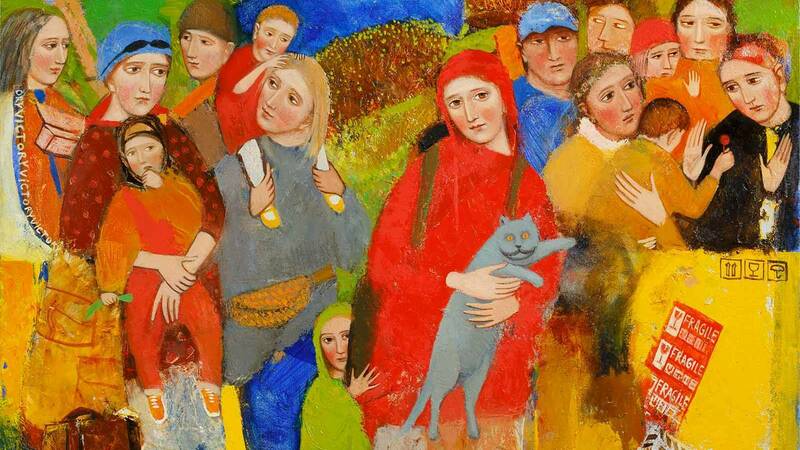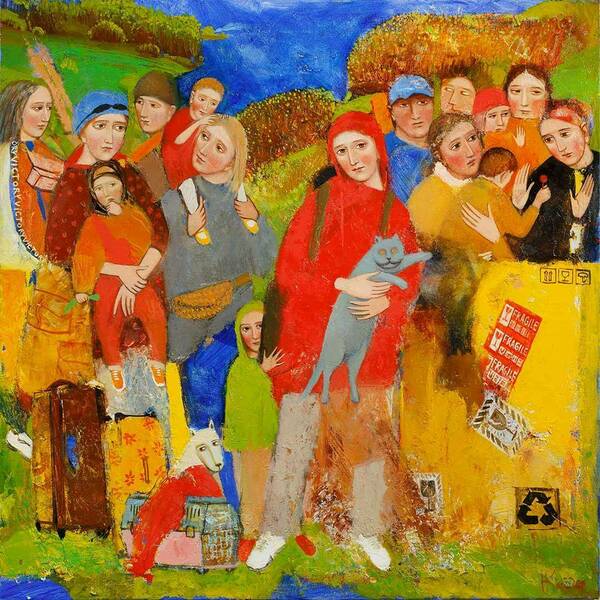
To my daughter
Pavlo Vyshebaba
Please don’t write to me of the war,
Tell me instead of the gardens around,
Do the grasshoppers sing the songs we adore?
Do the snails slowly inch upon sprouts?
Tell me about the words people use
To name their cats in faraway nations.
The only thing I want you to refuse
Is to hide between the lines your frustrations.
Do cherries or apricots bloom near your dwelling?
If they give you a bouquet of flowers,
Don’t talk about your escape from the shelling
Tell them we lived here the best life of ours
Let Ukraine become the land to explore,
Invite foreign friends and every person you meet.
We will show everybody after the war
How grateful we are for our children’s peace.
Тільки не пиши мені про війну,
розкажи, чи є біля тебе сад,
чи ти чуєш коників і цикад,
і чи повзають равлики по в’юну.
Як у тих далеких від нас краях,
називають люди своїх котів?
Те, чого найбільше би я хотів,
щоб не було суму в твоїх рядках.
Чи цвіте там вишня та абрикос?
І якщо подарують тобі букет,
не розказуй, як бігла ти від ракет,
розкажи, як добре нам тут жилось.
Запроси в Україну до нас гостей,
всіх, кого зустрінеш на чужині,
ми покажемо кожному по війні,
як ми вдячні за спокій своїх дітей.
Analysis by Abigail Keaney

"Spring" by Kateryna Kosianenko. Used with permission.
Structured as a piece of correspondence and written just three months after the beginning of Russia’s full-scale invasion of Ukraine in February 2022, “Доньці” (“To My Daughter”) by Pavlo Vyshebaba is an intimate look at the intricacies of a familial relationship temporarily severed by the war in Ukraine. Vyshebaba’s delicate, personal prose emphasizes the reality of life for Ukrainians both in and outside of the country. The poem’s universality — whereby the reader can imagine the daughter addressed in the poem to be their own — echoes that of Serhiy Zhadan’s 2017 poem “A Guy I Know Volunteered...,” which is discussed by Halyna Tuziak. Zhadan’s poem uses anonymity in much the same way to produce a widely applicable, yet deeply personal reflection on the consequences of war for those affected by it. Both poems masterfully highlight the fragility of personal relationships, ultimately serving to remind readers that what matters most, in both times of war and peace, are those we share our lives with — and those we leave behind.
The universal appeal of the poem is perhaps best illustrated by its success online. A video of “To My Daughter” being read by Ukrainian soldiers clutching images of their own daughters has over 50,000 views and hundreds of comments. Such popularity is indeed an endorsement of Vyshebaba’s attempt to capture a universal sense of love and loss in the face of war, the video itself serving as a visual reminder of the shared identity Vyshebaba seeks to highlight. A cross-section of men across Ukraine inhabit the role of the poem’s “father” as they narrate the poem line by line, all able to resonate with the poem’s message as if they had written it themselves. Again, much like Zhadan’s “A Guy I Know Volunteered...,” Vyshebaba’s general focus on universality is manifest in his poem, which is at once both deeply personal and broadly applicable.
This focus on the universal is clear in the poet’s artistic commitment to connecting his experience at the front to a wider audience through poetry and music, creative works that he shares freely online. He has written:
“Poetry explains our feelings — shows what we feel, being right here, on the front line. It is very important now because everyone reads poetry — both those Ukrainians abroad and those who remain in the country.”
In this way, Vyshebaba’s focus on solidarity and universality is perhaps also a reflection of his conviction that Ukraine should still develop its ability to conduct a dialogue with itself, a belief that he has expressed openly in interviews. Calling for greater tolerance in the country, Vyshebaba describes the need for the “level of discussion” among Ukrainians to increase too. In some ways, then, “To My Daughter” might partly be an attempt to ignite the discussion Vyshebaba so clearly sees as necessary to move forward as a united whole.
The similarities between Zhadan’s “A Guy I Know Volunteered...” and Vyshebaba’s “To My Daughter” as they relate to universality are emphasized by the fact that the central figure of both poems remains largely anonymous throughout. In “To My Daughter,” the eponymous child’s anonymity facilitates her role as a stand-in for the entirety of the next generation of Ukrainians, a blank canvas upon which Ukrainian readers might be able to draw their own family members. In this way, the character of the daughter, much like Zhadan’s young soldier, becomes a mechanism through which readers might be able to share in a universal sense of grief, but also perhaps a universal sense of solidarity as they too envision their own children in “faraway lands” while the war continues at home. Again, the poets emphasize the shared humanity at the heart of the respective relationships they’ve chosen to depict.
While “To My Daughter” is a poem written in wartime, from its opening line Vyshebaba establishes an immediate desire for distance from the present conflict. He asks his daughter — taken abroad for her protection — not “to write…of the war” but instead to write of the “gardens,” “flowers” and other aspects of her new home. The brevity of this acknowledgment of the conflict makes clear that the war is not something Vyshebaba wishes to linger on, instead preferring to focus on his daughter’s life outside Ukraine. In this way, it is clear from the poem’s very beginning that although the war is a critical force in this narrative, it will not be the focus of either Vyshebaba’s letter to or relationship with his daughter during this time of crisis. Such reluctance to dwell on the war is perhaps a product of Vyshebaba’s own position as a soldier actively participating in it, an identity that is not revealed in this piece but which might explain his desire to hear from the world beyond Ukraine and which anchors the poem’s sense of deep longing. Moreover, Vyshebaba’s lack of personal admission might simply be unnecessary — for contemporary Ukrainians, it is strikingly clear why Vyshebaba is writing to his “faraway” daughter and so his identity might be safely, uncritically assumed.
Despite this unwillingness to center the war, later in the poem Vyshebaba calls for his daughter to “refuse to hide between the lines…[her] frustrations,” dissuading her from minimizing the conflict’s emotional casualties. The poetic voice in “To My Daughter” illustrates the father’s emotional range: he urges his daughter not to downplay the severity of what is happening to her homeland but also wants her to represent Ukraine well to outsiders. In this way, Vyshebaba also speaks simultaneously to both his daughter and non-Ukrainian readers by asking them not to focus on the details of how Ukrainians are fighting, but instead on what they’re fighting for, the vision of a peaceful, secure, and vibrant Ukraine. This subtle, yet stirring sense of national pride underscores the poem with a defiantly optimistic tone which is ultimately rooted in a steadfast belief that Ukraine will prevail and that the separation of Ukrainian families is only temporary.
This confidence is emphasized by the fact that Vyshebaba chooses to center the poem on his daughter rather than himself. By shifting the poem’s focus from the present to the future in such a way, he infers that Ukraine’s assured peace belongs to the country’s “children” rather than its present adults. This shift in focus to the next generation of Ukrainians echoes Zhadan’s “A Guy I Know Volunteered…,” which, with its causal and understated language, evokes the lost youth and innocence of a volunteer Zhadan describes as “normal enough before he left” but forever changed after six months at war. This connection to Zhadan’s poem is also a reminder of the longevity of an almost decade-long conflict dating back to Russia’s annexation of Crimea in 2014. It is plausible that some of the young volunteer soldiers Zhadan had in mind when writing in 2017 are now fathers, still fighting at the front and writing letters to their children. This perspective places multiple generations in the context of war, even while Vyshebaba calls ahead to the next generation with the promise of peace. In a hopeful sense, this multi-generational focus is a reminder of the constancy of paternal and familial love, a constant cycle that serves as life’s purpose.
While this poem centers on the soldier’s daughter, the structure and tone also help convey a sense of the father’s own unsettled inner world. The narrator’s questions are interspersed with flat demands, a variety in sentence form that gives the poem a disjointed rhythm. This reflects the inner turmoil of a father on the frontlines, desperate to acknowledge his child’s inner “frustrations” before shifting sharply to ask if “cherries or apricots bloom near…[her] dwelling.” In this way, the poem becomes an intimate look not just at the relationship between father and daughter but also at the anxieties within this relationship as the father harbors a fear of disconnection from his child over time.
“To My Daughter” by Pavlo Vyshebaba is an incredibly intimate yet immediately universal piece. Through its purposeful, careful prose, the poem emphasizes the reality of personal relationships between Ukrainians both inside and outside of the country, touching on a universal sense of humanity and a shared sense of solidarity in the face of the unthinkable. Ultimately, “To My Daughter” looks ahead to a peace that is not only possible but is, for Vyshebaba, inevitable.
Research by: Abigail Keaney and Halyna Tuziak
Poet: Pavlo Vyshebaba
Translator: Anhelina Yurkiv
Theme: The (un)Known Soldier
"To my daughter" by Pavlo Vyshebaba, translated by Anhelina Yurkiv, reproduced by permission.
Header image: “Spring” by Kateryna Kosianenko, oil on canvas, 2022. Image used with permission from Kateryna Kosianenko.